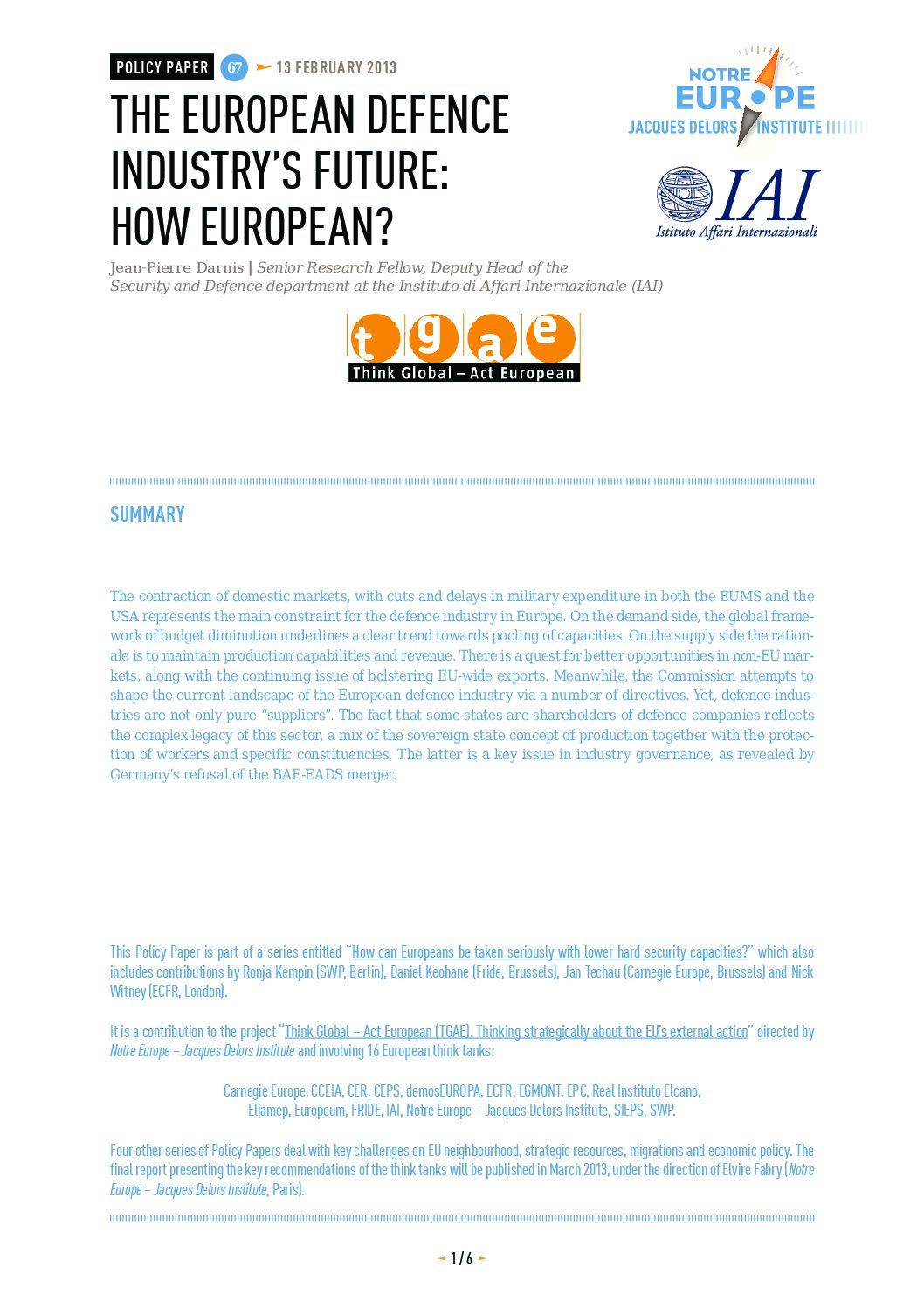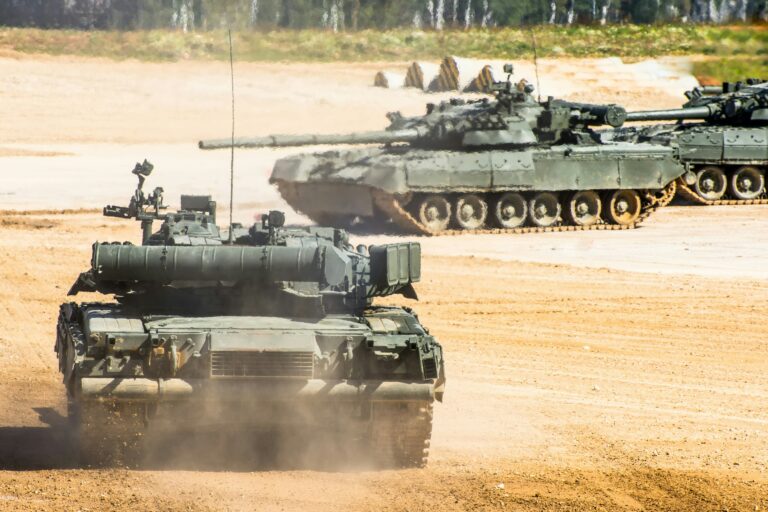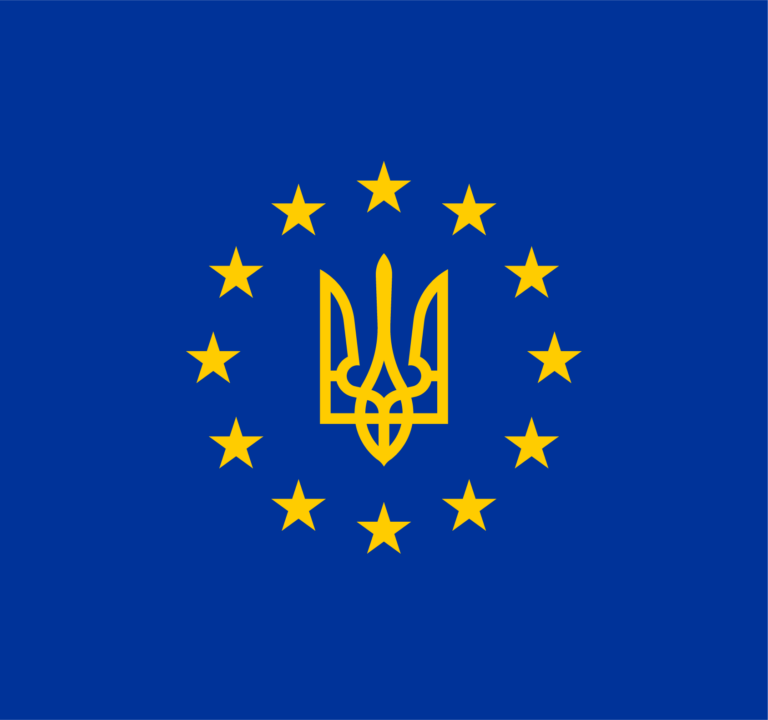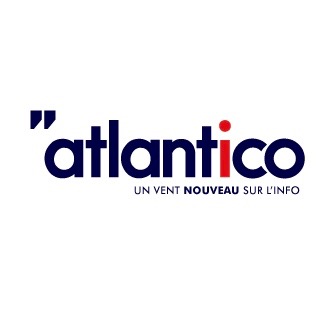Policy Paper 67
L’avenir de l’industrie de défense européenne : à quel point est-elle européenne ?
Jean-Pierre Darnis, Chercheur Senior, Directeur du département Sécurité et Défense, IAI —
The contraction of domestic markets, with cuts and delays in military expenditure in both the EU Member States and the USA represents the main constraint for the defence industry in Europe. On the demand side, the global framework of budget diminution underlines a clear trend towards pooling of capacities. On the supply side the rationale is to maintain production capabilities and revenue. There is a quest for better opportunities in non-EU markets, along with the continuing issue of bolstering EU-wide exports. Meanwhile, the Commission attempts to shape the current landscape of the European defence industry via a number of directives. Yet, defence industries are not only pure “suppliers”. The fact that some States are shareholders of defence companies reflects the complex legacy of this sector, a mix of the sovereign State concept of production together with the protection of workers and specific constituencies. The latter is a key issue in industry governance, as revealed by Germany’s refusal of the BAE-EADS merger.
| 12/02/2013
Ce Policy Paper est une contribution de Jean-Pierre Darnis (IAI) au projet ‘Think Global – Act European (TGAE). Thinking Strategically about the EU’s external action dirigé par Notre Europe – Institut Jacques Delors (rapport disponible en mars 2013, dir. Elvire Fabry, Chercheur Senior, Notre Europe – Institut Jacques Delors).
Avant la publication du rapport final présentant les recommandations clés des16 think tanks mobilisés dans ce projet, 5 séries de Policy Papers portent sur les sujets suivants : PSDC, Voisinage de l’UE, Ressources stratégiques, Migrations et Politiques économiques.
Ce Policy Paper fait partie de la série intitulée « Comment les Européens peuvent-ils rester crédibles avec des capacités de défense réduites ? », qui comprend les contributions de Nick Witney (ECFR, London), Ronja Kempin (SWP, Berlin), Daniel Keohane (Fride, Bruxelles) et Jan Techau (Carnegie Europe, Bruxelles).
Voir les autres contributions de la série de défense >>
Ce projet est mené avec le soutien du  </div />
</div />
SUR LE MÊME THÈME
ON THE SAME THEME
PUBLICATIONS
Guerre en Ukraine : un impact transformationnel sur l’industrie de défense européenne

Livre Blanc : quelles perspectives pour l’Europe de l’armement ?

Vers une alliance UE-Ukraine : Un plan pour une mission de formation conjointe

MÉDIAS
MEDIAS
« Pologne, la puissance européenne de 2025 ? »

Nicole Gnesotto, historienne : « D’un pacifisme structurel, l’Europe doit passer à un réarmement solide »

L’OTAN demande aux entreprises européennes de se préparer à un « scénario de guerre » : concrètement, de quoi la France est-elle capable ?

ÉVÉNEMENTS
EVENTS
Euroquestions #67 | La défense européenne face à la guerre en Ukraine

Académie Notre Europe | Session à Bruxelles

Euroquestions 56 | Comment l’Union européenne peut-elle armer l’Ukraine ? [EN]

Euroquestions #55 | La politique étrangère et de défense européenne à l’épreuve de la guerre en Ukraine

Euroquestions | Relations franco-allemandes : 2023, année de la relance ?

Euroquestions | La guerre en Ukraine met-elle en danger la cybersécurité en Europe ? [EN]

Euroquestions | Guerre en Ukraine : la réponse de l’UE, au-delà des sanctions

Les relations transatlantiques à l’heure de Joe Biden : Quelles implications pour l’Union européenne

DIPLOMATIE EUROPEENNE ET ACTION EXTERIEURE DE L’UNION

Webinaire : Sanctions extraterritoriales américaines

Académie Notre Europe – L’Europe Commerciale et de la Défense

The Future of Trade: How can Europe and the United States join forces to rewrite the post-COVID trade agenda

Quel avenir pour le dialogue transatlantique après l’élection de Joe Biden ?

Etats-Unis : définir une stratégie pour l’Europe

Etats-Unis : définir une stratégie pour l’Europe

Etats-Unis : définir une stratégie pour l’Europe

Euroquestions | Un an de Green Deal – 5 ans d’Accord de Paris : où en est le monde ? Où en est l’Europe ?

Euroquestions | Un an de Green Deal – 5 ans d’Accord de Paris : où en est le monde ? Où en est l’Europe ?

Euroquestions | Un an de Green Deal – 5 ans d’Accord de Paris : où en est le monde ? Où en est l’Europe ?

Euroquestions | Un an de Green Deal – 5 ans d’Accord de Paris : où en est le monde ? Où en est l’Europe ?

Soirée électorale : Elections américaines, sociétés, imaginaires

Euroquestions | Relance et puissance : mots d’ordre de la rentrée européenne

AmCham Confidential

Ateliers de la Citadelle 2019 L’armée européenne y penser toujours n’en parler jamais ?

Hambourg, 16 novembre 2018 – FOTAR 2018 : La politique environnementale transatlantique

Paris, 6 novembre 2018 – Trump à mi-mandat, le pire est-il toujours sûr ?

Lille, 25 octobre 2018 – L’Europe de la défense dans un monde de brutes

Bruxelles, 16 octobre 2018 – La politique commerciale européenne en 2019 et au-delà

Blois, 12 octobre 2018 – Coopération, concurrence ou guerre ? La mondialisation dans tous ses États

Paris, 21 septembre 2018 – Trump, Brexit et les nouveaux défis de la politique commerciale européenne : la réponse européenne est-elle adaptée ?

Pékin, 26 mars 2018 – Le monde va-t-il connaître une guerre commerciale ?

Paris, 20 mars 2018 – Défense en Europe

Lille, 14 mars 2018 – La défense européenne : un « moment historique » ?

Paris, 15 février 2018 – L’avenir de la défense européenne

Paris, 9 février 2018 – Académie : l’Europe dans le monde

La Haye, 25 janvier 2018 – Maîtriser la mondialisation : la politique commerciale européenne à l’ère Trump

Paris, 16 janvier 2018 – Séminaire « Horizon 2020 »

Nicosie, 22 juin 2017 – La politique « America first » de Trump et les intérêts européens

Paris, 1er juin 2017 – Amérique et Europe à l’occasion du 70ème anniversaire du Plan Marshall

Le Chesnay, 20 mai 2019 – Trump et l’avenir de la politique commerciale européenne

Genshagen, 21-22 octobre 2016 – La politique européenne de sécurité et les relations UE-voisins

Paris, le 5 juillet 2016 – TTIP et CETA aideront-ils les PME à entrer sur les marchés des USA et canadiens ?

Paris, le 14 juin 2016 – Le TTIP : un projet d’accord dangereux ou un partenariat pour l’avenir ?

















